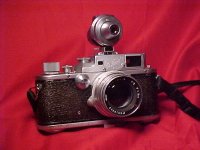The fixed ring just behind the "snout" has focal lengths marked on it. The rotating knurled ring behind it has two lines marked on it, one shorter than the other. The long one should be set against the focal length in use for far distances (30 ft. and over), the short one should be used for near distances (6 ft. and under). The recommendation that a point between the two lines should be used for distances betwen 6 ft. and 30 ft. is not so practical, since there is little space. You will see that this ring changes field size slightly. Many people, to be on the safe side, always use the short line.
To adjust for parallax, you use the control just below the eye-piece. Move it to the right for infinity, to the left for closest focus. You will see that when it is exactly in the middle, it is set to a shade under 7 ft. For much of the time I leave it there, just tilting the camera upwards a little when photographing something closer and tilting it downwards when dealing with something farther away. To benefit from the precision of which the finder is capable, specially with longer lenses, it is best to use the markings.
I have spoken of the VIOOH I have. These things were not completely standardised, and variations are possible. The principles remain the same.


